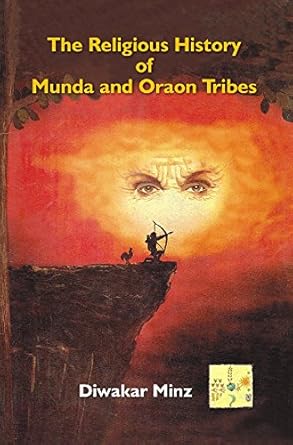The Religious History of Munda and Oraon Tribes
Regular price
₹ 279
Sale price
₹ 279
Regular price
₹ 300
Unit price
Save 7%
Tax included.
| Author | Diwakar Minzdfad |
| Language | English |
| Publisher | Gyan Books |
| Pages | 416 pp |
| ISBN | 978-9353246235 |
| Book Type | Paperback |
| Item Weight | 0.651 kg |
| Dimensions | 3*X13*X22* |

The Religious History of Munda and Oraon Tribes
Product description
Shipping & Return
Offers & Coupons
ABOUT THE BOOK:- In India, the State of Jharkhand along with the forest areas of the surrounding Gondwana Plateau is the centre of dense population of tribals. Among these tribes, the Munda and Oraon tribes are not only important in view of their number but also for their cultural and religious heritage. Most of the tribes have Munda and Oraon roots, while their religious beliefs and customs, too, are accordingly based on them. Some scholars have tried to study their religious beliefs and customs but till date no effort has been made to reveal the historical aspect of these religions. In this book, the place of origin of Munda and Oraon tribes has been traced, and those routes have been considered through which these tribes reached Chhotanagpur. Those influences have also been kept in mind which affected and helped in developing the practical and philosophical structure of their religion during the period of their migration. Since the writer is a tribal and has lived in proximity of tribal religion and society, he has brought together through a decade of intense labor those facts which give reasonable basis to the history of tribal religion. Prior to this, some Christian missionaries studied the Munda and Oraon religions as also their development. They have stated that their religions are monotheistic and based on ghosts and spirits. The author has opposed this view. He has presented a sequential study of the development of godliness of tribal gods. He has thrown light on tribal religious philosophy inherent in the development of different religious institutions which can be glimpsed in the religions of so called civilized communities of the world. The author believes that the way the world has conceptualized Nature or visible natural incidents to be the material basis of the appearance and development of gods of ancient tribes, similarly the Munda and Oraon tribal gods can be traced to Nature. In some European and Indian religions the way the idea of one Supreme God alongwith sectoral gods has developed, in the same way sectoral gods can be found in Munda and Oraon religions. Since tribal religions do not have written texts, those studying them have had full license to interpret them in their own ways. All the wrong notions spread about these religions till date. This book presented with historical facts is very useful for those who have an interest in tribal religions. ABOUT THE AUTHOR:- Dr. Diwakar Minz: M.A., L.L.B., Ph.D., D.Litt. Father: Late Siri Goenda Minz, Retd. I.A.S. Village: Jhinjhari, P.O.: Mandar, District: Ranchi (Jharkhand) At Present: Proctor, Ranchi University, Ranchi & Associate Professor, University Department of History, Ranchi, member, Board of Governors, Indian Institute of Management of Ranchi, Executive Member, Indira Gandhi National Tribal University, Amar Kantak (Madhya Pradesh) Member, Syndicate & Senate, Kolhan University, Chaibasa (West Singhbhum) Jharkhand. Guide & Supervisor: History of Jharkhand's Tribal Religions, Customs, Culture & Social Institutions, Jharkhand Movement and History of it martyrs etc. Books and Publications: Jharkhand Ke Shaheed, Encyclopeadia of Tribals of Jharkhand, and History of Jharkhand and Origin of Oraon (in press) and several Research Articles. Other Activities: Former Member, National Scheduled Area and Scheduled Tribe Commission, Govt. of India New Delhi, International Labour Organisation, Indian Branch, New Delhi, Member, Board of Governors, Indian Institute of Management, Kolkata (W.B.) & Kozhi- Kode, Kendriya Vidyalay Sangathan, New Delhi, Former Member Jharkhand State Tribal Advisory Council, Jharkhand Wild-life, Advisory Council. Special: Draft of History of Jharkhand and of Separate extensive Book on Oraon religions ready and work is in progress. CONTENTS:- Foreword . 11 Preface . 13 Acknowledgement . 17 Mundari Words and their Explanation . 19 Kudukh Words and their Explanation . 25 Glossary of Abbreviations . 31 Chapter - 1 Introduction . 33 • Pertaining to Munda Tribe • Pertaining to Oraon Tribe • Source • First Chapter: Preface • Second Chapter: Historical Introduction of Munda and Oraon Tribes • Third Chapter: Munda Religion, Sarna Religion • Fourth Chapter: Sarna Religion: Oraon Religion • Fifth Chapter: Conclusion. Chapter - 2 Historical Introduction of Munda and Oraon Tribes . 45 • Sir Herbert Risley’s Theory • The Opinion of Dr J. H. Hutton • Negrito • Proto Australoid • Mongoloid • Mediterranean • Western Brachycephales • Nordic • Munda Tribe : Origin and Development • The Proof of Language • Anthropological Proof • Prehistoric Proof • Traditional Proof • Fixing of Time Period • Migration to Chhotanagpur • Oraon Tribe Kurukh and Oraon Words – their Origin • Place of Origin and Migration to Chhotanagpur • The Main Principle Regarding Place of Origin • Dravidian Versus Tamil • Mongolian Principle • The Central Asia Theory • The Semetic Theory • Mesopotamian Theory • The Theory about Egypt • The Mediterranean Theory • Language Proof • Traditional Evidence • The Flight from Rohtasgarh • One other Influence • The Intermingling of the Mundas and Oraons • The Munda Tribe of Chhotanagpur • The Mukhiya (head) and Pahan (Priest) in Village Organisation • The Oraon Tribe of Chhotanagpur • The Priest (pahan) and Mukhiya (head) in the Village Organisation • The Emergence of Raja Phanimukut Rai and the Protection of Munda/Oraon Culture from the Invasions of the Mughals • Traditional Village Arrangements and their Cultural Heritage. Chapter - 3 Munda Religion: Sarna Religion . 111 • Munda Religion : Sarna Religion • Modern Times and Munda Religion • The Deities of Mundas • Singbonga • The Divine Form of Singbonga in Religious Stories • The Birth of Man and Expansion of Race • The Expansion of Race • The First Plough • Division of Time • Rain of Fire • Asur Avdan • Singbonga’s Intelligence Personified Wife • Nage Aera • Banita Bonga • Occult Practices • Occult Practices : An Anti Religious System • Occult Practices and Initiation of Witches • Magic Spells • The Relationship between Witches and Bongas • The First Witch of Creation – Singbonga’s Wife • Devra: A Parallel Religious Institution Against Sorcery • Mahadev and Parvati: In Black Magic and Parallel Religious Institution • Other Activities based on Superstitions: Hembul roa • The Sight of the Evil Eye • Aadaat : The Evil Eye of praise • Soso-tapa • Parv (festivals) • The Re-appointment of Dhangars • Fagu • Ba or Sarhul • Hone-ba • Batauli • Karam • Dasai • Kolom Singbonga • Jome – Nava • Ind Festival • Sohrai • Soso-Bonga • Kili or Gotra and Totem • Twenty one Parha : Twenty one Kili • Chief Kilis and their Emergence • Tuti Kili • Bodra Kili • Soy Kili • Horo or Kachchap Kili • Nag Kili • Another story • The Transformation of Kili • Change in Kili • Kili and Parha • Totem • Sanskar or Purification Ceremonies • Chedey Uri • Kudi-lel • “Da-Adgu” • Bala • Signs • Lagon- tol or Idi • Sanketik Vivah • Mandola-dul • Kalsa galang • Cho • Uli Adandi • Daprom or Mangrapi • Da-hirchi and Chumman • Sasang-goso • Da-au • Dul-da • Sinduri-rakab or Sindoori tika • Samdhi- Bhet : Milan • Kata anung • Chumavan • Baba-hatukam • Jimma • The Rituals Conducted in the Groom’s Home after Marriage • Shav-sanskar or Dah Sanskar • Raya • Umbul-ader • Jung-Topa • Roa. Chapter - 4 Oraon Religion: Sarna Religion . 235 • Sarna Religion : Kurukh Religion • Pahan and his Assistant • Assistant • The Selection of Pahan and Assistant • Selection of Assistant • The Gods of the Oraons • Dharmes • The Forefathers (gods) or Pach Baler • Chala Pachcho • Paat naad or Hill King • Dadha-Desauli • Mahadaniya • Mahadev • Devi Mai • Chappar Budhiya • Chandi Pahar • Badanda Peeper • Vanshakti Garha-dhorachatur- Seeman • Toosa Burha • Classified Gods-goddesses and Naad • Chandi • Selection of Chandi-pahan : Pestle Movement Procedure • Worship • Achhrayal/Achhrain • Joda • Khunt Naad • Badanda Pachcho • Chingri Naad • Goensali Naad • Surjahi Worship • Magic and Spells • Witch • Witch-Initiation • Witches-work Procedure • Mati • The Desired Goddess of Mati : Kali Mai (mother) • Treatment by Matis • Finding out the Naad • “Bahi-Pakarna” • The Handing over of Naad to Darha Naad • Bhagat or Sokha • Getting the position of Bhagat or Sokha • Mahadev-Kuri and Worship of God • The Social Life of the Bhagat • The cure and treatment of disease • Gotra and Totem • Gotra and Totem • Totem: Division and Change • The Religious Side of Totem • Festivals • Phagu • Sarhul/Khaddi/Khekhel Benja • Declaration of Sarhul festival and Preparations • Dari-chhitna • Nega-Amm • The Collecting of Cocks, Fishes and Crabs for Worship • The Religious Bath of Sarhul • Song • Water Sport • Isoom sindri or the Marriage of Pahan-Pahnain • Invocation of Pach-Balar • Distribution of Blessed Rice • Chalam Gucha or going to the Sarna Place in a Procession • The Preparation for the Worship • The Offering of Sacrifice • Kakro Sarjana or the Frying of Crabs • The Welcoming of the Pahan by the Pahanain • Cheprai Murga • Ona Mokhna • The Feast of the Women • Dhangar Pahan or Mutri – Chandi’s Pahan • Poomp Kherna or Phul Khusi • The Handing over of the Batari (water pot) • The Seating in the Winnowing Fan • Hariari Festival • Kadlota • Karam Festival • The Growing of Jawa Flowers • The Cutting of Karam Branch • Planting of the Karam Branches • Synopsis of a Prevalent Legend • Brief Summary of the Second Popular Story • Karam Darshan 52 (philosophy) • Jitiya Festival • Sohrai • Kharra Puja (worship) or Kharihani • Sanskar • Fifth Day or Purification Ritual • Joda-Kamna • Paisari • Naming Ceremony or “Name Pinjna” • Joodo-Eda or Tying of Hair • Jokh Edpa or Entry into Dhumkuriya • Marriage Ceremony • Decision Regarding Signs and Bad Signs • Muhi-Era • Lagan Bandhi • Koha–pahi • Poomp-Mejhna • Milanee • Koha-pahi • Preparations for the Wedding • Gurkhi-nikharna • Isung Sindri • Khiri Tengna • Sabha Sindri • Mandi ona • Welcoming of the Bride in the Groom’s House • Death Ceremony • Ache Makha or Chhai Bhitarna • The Ritual of Chai Bhitarna • Formal Burial • The Rule and Method of Death Ceremony • The First Day • Second Day • Third Day • Utur Khila • Hochole-poomp pesa • Harbodi or Immersing of Bones in Water • Fourth Day • Fifth Day. Chapter - 5 Conclusion . 357 • Munda religion • Rain of Fire and Singbonga • The Appearance of Sarna Religion • The Development of Sanskar (ceremonies) and Festivals • The Development of Necromancy, Witch and Devra etc. Institutions • Oraon/kudukh • Comparative Historical Survey of Sarna Religion of the Mundas and Oraons • Singbonga versus Dharmes • Other Gods • Festivals • The Main Festivals of Mundas • The Main Festivals of Oraons • Ceremonies • The Main Ceremonies of Mundas • The Main Ceremonies of Oraons • Gotra or Kili. Annexures . 383 Bibliography . 403 Index . 409 The Title 'The Religious History of Munda and Oraon Tribes written/authored/edited by Diwakar Minzdfad', published in the year 2017. The ISBN 9789353246235 is assigned to the Paperback version of this title. This book has total of pp. 416 (Pages). The publisher of this title is Kalpaz Publications. This Book is in English. The subject of this book is Tribal Studies. Size of the book is 13.34 x 21.59 cms Vol:-
- Sabr– Your order is usually dispatched within 24 hours of placing the order.
- Raftaar– We offer express delivery, typically arriving in 2-5 days. Please keep your phone reachable.
- Sukoon– Easy returns and replacements within 7 days.
- Dastoor– COD and shipping charges may apply to certain items.
Use code FIRSTORDER to get 10% off your first order.
Use code REKHTA10 to get a discount of 10% on your next Order.
You can also Earn up to 20% Cashback with POP Coins and redeem it in your future orders.








